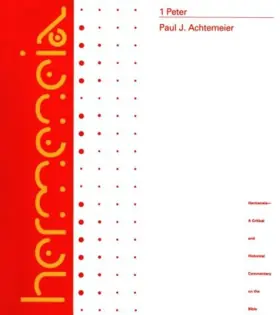

Collections
This book appears in the following featured collections.
- Favorite Advanced NT Commentaries by Jeremy Pierce (parableman)
- D. A. Carson's Commentary "Best Buys" by D. A. Carson
- New Testament Advanced Commentaries by Moore Theological College Journal: Societas
- Basic Library Booklist by Detroit Baptist Theological Seminary
- The Pastor’s Bookshelf by Scot McKnight
- New Testament Commentaries & Monographs by Princeton Theological Seminary
- Nijay Gupta's Top NT Commentaries by Nijay K. Gupta
- Recommended New Testament Commentaries for Evangelical Pastors by Thomas R. Schreiner
- TGC: Scholarly Commentaries by The Gospel Coalition
Reviews
Well-done but now somewhat dated commentary reflecting standard mainline/liberal approach to the epistle.
[Full Review]
D.A. Carson insists this is the fullest commentary at the exegetical level and a masterpiece of careful scholarship. “Achtemeier has a knack for getting to the heart of an issue quickly, while the footnotes allow more advanced readers to pursue fine points. The writing is clear, and much of the exegesis is admirable.” Having said all that, he can recommend it only with some caveats because Achtemeier holds that the epistle is pseudonymous and written in the 80s or 90s. Obviously some care and discernment will be in order.
[Full Review]
I acquired this volume because most people I consulted considered this to be the definitive work on 1 Peter. While it may have been that at one time, I believe it is far surpassed by Jobes. Where Achtemeier's thoughts are salient, Jobes will quote him. I disagreed with many of his positions and conclusions, and did not find the volume worth the money overall. If one were doing more academic research, it would surely be worthwhile, but for preaching I found it of limited value.
PJ Achtemeier's commentary is another landmark by a veteran NT scholar; complete, exegetical and theologically alert.
[Full Review]
Two quotations from Achtemeier's preface reveal the kind of commentary this is. First and more important, "Because the commentary represents an encounter with the text of 1 Peter as it appears in the New Testament, I have sought to avoid the expedient of blaming ill-understood or partially relevant portions drawn from earlier traditions to explain the obscure portions of the letter." Second, "It has not been my intent to prove wrong all who preceded me with commentaries on 1 Peter, nor have I sought as a matter of principle to occupy the safe middle ground between extreme scholarly opinions. I have avoided neither the conventional nor, on occasion, the more radical suggestions when in my estimate they best explain the available evidence" (p. xvi). The result is a classic commentary in the great tradition, recalling the Macmillan series, the French Etudes Bibliques, and some of the better volumes of the ICC. Its closest relative in the Hermeneia series is H. Attridge on Hebrews. It is not a commentary trying to be a monograph, nor is it beholden to current fads or cutting edge methodologies. Achtemeier is explaining 1 Peter, not rewriting it, and we all have reason to be grateful. In his extensive introduction Achtemeier tackles first the question of authorship (pp. 1-43). For a number of reasons he opts for pseudonymity, but not without facing honestly the two strongest objections to that position: first, the argument that "such a practice was in fact morally repugnant to the culture in which 1 Peter arose" (p. 39), and second, "the question of why the name Peter would be chosen for a letter so transparently Pauline in its conception" (p. 2). In some ways he is more convincing in what he admits than in what he positively affirms. Achtemeier admits that "Falsification of authorship was in fact not routinely regarded as harmless; the Gospel of Peter was rejected as a falsification, as was the Acts of Paul when the true author became known." But he makes the point that "it was the content more than any moral repugnance at pseudonymity which prompted the rejection" (p. 40).
[Full Review]








